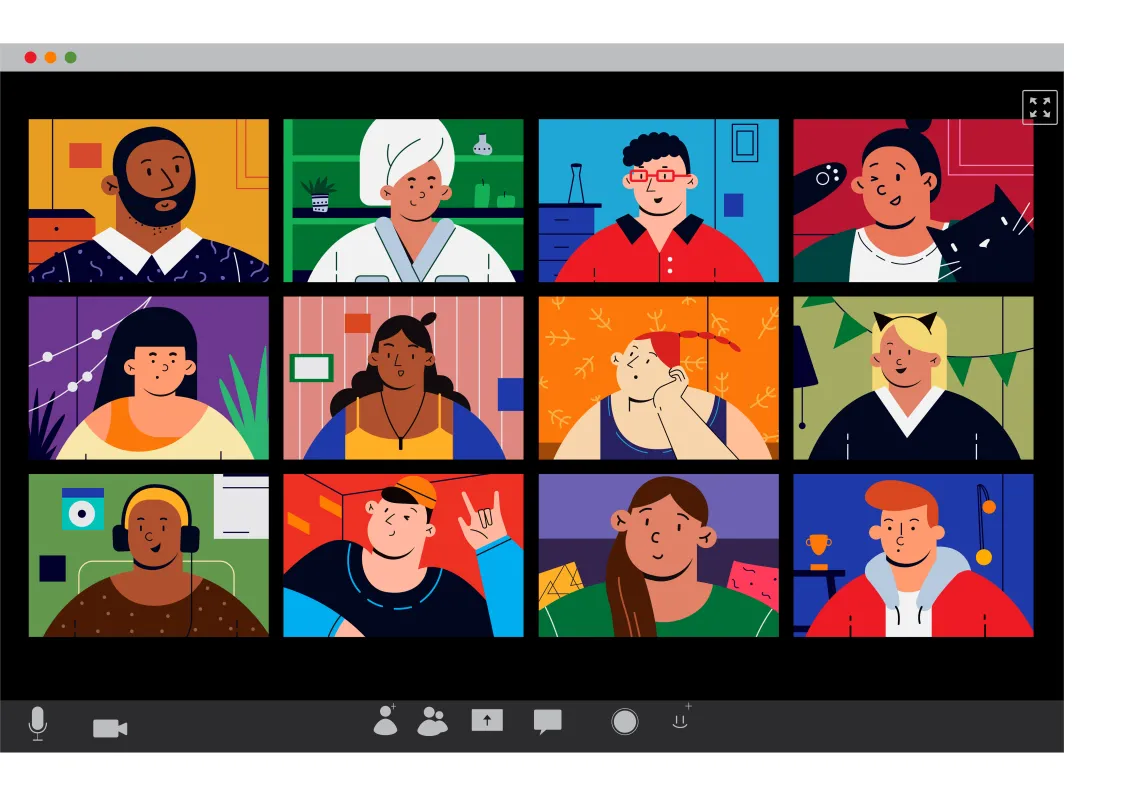Find Your Community

By Luke Wink-Moran
Art by: Valery
Finding a community in graduate school is one of the best things students can do for their mental health, and for their GPAs. Dr. Kory Floyd, whose research focuses on the communication of affection in close relationships and its effects on stress and physiological functioning, explains why:
“For us, social connection is not merely a preference, it is a need; I think our about our need for social connection as on par with our need for food and sleep. If we don’t meet that need, we suffer. You wouldn’t try to do grad school without eating, and you shouldn’t try to do it without close social connections.”
The suffering Dr. Floyd mentioned manifests as loneliness, and it doesn’t always happen because students don’t feel close to their friends and family.
“When we start to feel lonely, it’s not because we have no social connection in our lives; it’s because that social connection is not as proximal. Because of the pandemic, that’s the case for a lot of people.
But unlike our need for food and sleep, when our bodies experience a lack of social connection, they don’t always motivate us to seek it out.
“Logically,” Dr. Floyd points out, “you would think that if you feel lonely, that would motivate approach behaviors. But, paradoxically, it has just the opposite effect: it tends to motivate avoidance behavior. When people feel lonely, they tend to retreat within themselves. Often, something has to interrupt their retreat to snap them out of that behavior.”
And even when people do recognize that they need to find a social circle, it can be hard to reach out.
“Realizing you’re lonely creates a sense of failure: I’m not interesting enough; I’m not smart enough; I’m not funny enough, etc. If we feel that sense of shame around our loneliness, it can make it harder to do the very things that would remedy it,” says Dr. Floyd.
But remedy it students should, because, according to Dr. Floyd, “without strong social connections around us, we feel more susceptible to stressors. What follows from that often are detriments to our health. Loneliness and deprivation are detrimental to our health in almost every way that has been studied.”
So, for students who want to find community in a healthy, safe, socially-distanced way, the Graduate Center has compiled a brief list of organizations and resources around campus for graduate students, starting with our very own Grad Chats.
Grad Chats originated as a place to provide information and build community for graduate students of color. Over the months they have been taking place, the chats have evolved to a space that celebrates the resilience, strength, and contributions of our talented graduate and professional students. Last fall, Grad Chats featured a series of excellent presentations on career preparation, campus writing services, campus COVID-19 resources, authentic networking, building a mentoring team, learning to celebrate success, and practicing radical self-care
To watch a conversation with Grad Chats’ moderator, Nura Dualeh, click here
Jennifer Daw, a PhD student in the Life Sciences, says, “Grad Chats is a safe space of support. It has been therapeutic and empowering. Our weekly meetings have become one of my most stable routines during the pandemic. It is everything you want and more in a community.”
Alice Solomon, a student in the Molecular Medicine program, agrees, calling the Chats “an uplifting experience,” and explaining, “It was one of those things that I didn’t even know I needed, but benefited from greatly. With limited social interaction during the pandemic, it was so nice to share time with fellow grad students where we could just talk about what’s going on in our lives and support each other emotionally.”
For students whose interests might lie elsewhere, Jan Courtney, a counselor who works in University of Arizona’s CAPS Department, has several suggestions.
“In the Closed Graduate Student Support Group, students meet regularly, share their experiences, and build community,” says Courtney. The group is currently accepting graduate students for enrollment and can be found here. There is also a support group specifically for LGBTQ+ students, which can be found here, and a Monday-morning meditation group, to be found here.
As Dr. Floyd notes, “If you spend time socializing, your work will benefit: you’ll be more creative; you’ll be more energized; you’ll bring new perspectives. Your time at work will be better if you counterbalance with time spent meeting your needs for social connection.”
Find your community in the links below and on the Graduate Center “Resources” page:
Grad Chats
https://gradcenter.arizona.edu/articles/2020/10/weekly-grad-chats-community-diversity
Closed Grad Student Groups
https://caps.arizona.edu/grad-students-open-group
LGBTQ+ student group
https://caps.arizona.edu/lgbtq-support-group
Meditation Mondays
CAPs homepage (Click groups to view all Graduate Student groups)
International Student Services (ISS)
https://global.arizona.edu/iss
Black Graduate Students Association (BGSA)
https://aasa.arizona.edu/black-graduate-student-association
Graduate Students of Color Collective
https://arizona.campuslabs.com/engage/organization/GSCC
Office of Diversity and Inclusion (includes links to the Guerrero Center, the Women and Gender Resource Center, Asian Pacific American Student Affairs, Native American Student Affairs, the Disability Resource Center, and the VETS Center)
https://diversity.arizona.edu/cultural-and-resource-centers

